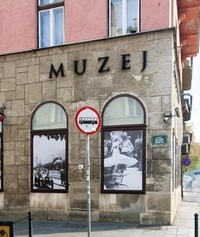Photo. The Assassination Corner in Sarajevo - once the scene of a moment that forever changed the course of history. © Travel Explorations.
The exact place of the assassination is now known as the Assassination Corner. It was near the intersection of Appel Quay - now Obala Kulina bana, and Franz Josef Street - now Zelenih Beretki, right by the Latin Bridge. The spot where Gavrilo Princip fired his shots is marked by a plaque on the wall of a building near the bridge. It serves as a stark reminder of the moment that changed world history.
On Sunday morning, 27th October in 2024, I approached the spot where the assassinator fired those historic shots. Standing there, facing the plaque on the wall, I couldn't help but starting to feel sadness. It was almost overwhelming to sense the weight of history in such a quiet, unassuming street corner - now peaceful and ordinary, but once the site of a moment that changed the world forever.
It's hard to picture the chaos that must have erupted here, but being in that spot made me reflect deeply. It reminded me of just how fragile peace can be and how quickly it can be shattered by violence and ambition.
What struck me most was how such a small act in such an insignificant place could spark a chain reaction that devastated nations and changed the lives of millions. It felt almost surreal to stand there and think about the ripple effects of that one moment.
Nearby, there is the Sarajevo Museum 1878–1918, which focuses on the period of Austro-Hungarian rule and the events leading up to World War I, including the assassination. The assassination in Sarajevo was a catalyst rather than the root cause of the World War I. The assassination was traced to a Serbian extremist group that wanted to increase Serbian power in the Balkans by breaking up the Austro-Hungarian Empire. Austria-Hungary, with the support of Germany, issued an ultimatum to Serbia, which ultimately led to the declaration of war. This set off a domino effect as alliances were activated, drawing in countries like Russia, Germany, France, and eventually Great Britain.
I am still thinking of the shot that revealed the fragility of peace in Europe, where complex alliances, militarism, and nationalism created a powder keg ready to explode. That frightens me. It’s unsettling, especially when I consider the parallels with today's world, where rising tensions and conflicts bubble all around us, threatening to ignite at any moment. This act set off a chain reaction of events that ultimately led to one of the deadliest conflicts in history.
I cannot think of a more fitting proverb than "A single spark can start a wildfire." It resulted in the deaths of over 15-16 million people - both soldiers and civilians, reshaped borders, and set the stage for World War II just two decades later. It’s good to keep in mind that peace, while precious, is fragile and must be actively maintained through dialogue, understanding, and compromise. Today's geopolitical tensions require careful management to avoid a similar catastrophe.
During the four-year conflict, Germany, Austria-Hungary, Bulgaria and the Ottoman Empire (the Central Powers) fought against Great Britain, France, Russia, Italy, Romania, Canada, Japan and the United States (the Allied Powers). The brutal combination of new military technologies and the horrors of trench warfare led to unprecedented levels of carnage and devastation, making World War I one of the most destructive conflicts in human history.
With that in mind, wandering through the streets of Sarajevo, I'm fascinating to observe how people live so well together, especially after all they've been through. It`s a big contrast to the past. I am thinking both about how much locals suffering during the world wars and the Bosnian War - ethnically rooted war in Bosnia and Herzegovina that took place from 1992 to 1995.
The Old Town feels like a world unto itself - vibrant tapestry of cultures woven into every corner. There's something enriching about walking through those narrow-cobbled streets, where mosques, churches, and synagogues stand side by side. It's truly rewarding to soak in the lively atmosphere, feeling the pulse of a city that has turned its history of division into a celebration of unity. It's a place where the past and present coexist in harmony, creating an energy that's as warm as it is inspiring.
There are profound lessons humanity can learn from that mentioned dramatic moment in history to help avoid war in the future. First and foremost we need to understanding that even small actions have the potential to impact the world. By valuing dialogue over conflict, empathy over hatred, and cooperation over division, we can work together to prevent the horrors of war from happening again.
Stein Morten Lund, 16th November 2024
Additional information












